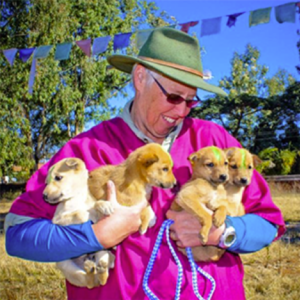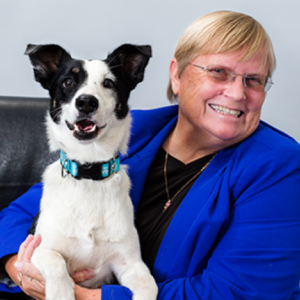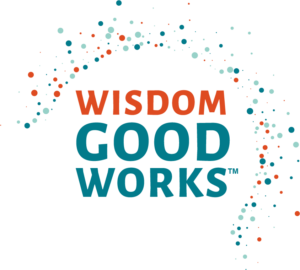Q & A With the Founders
WISDOM Good Works’ Mission, Values and Vision
Question: WISDOM Good Works is a nonprofit whose mission is to use science to restore ecological balance around the world. And your primary approach for restoring that balance is through rodent fertility control. Why did you decide to create an organization centered around this mission?
Dr. Mayer: Well, Cheryl and I have experience that runs the gamut from academia to public companies with high commercialization to nonprofits. And over the years, and I can’t say how many thousands of hours of cocktail napkin chatting, we now believe—and all of the data points to this—that a non-profit organization is going to be the best way for us to achieve our goals.
Q: So what are your goals?
Dr. Mayer: We believe humane animal population control is absolutely critical to achieving environmental balance. So a primary goal is to use fertility control more and have less poison in the environment. To do that, we hope to create pockets of demand for non-poisonous fertility control.
Dr. Dyer: Another goal is basic public awareness. Years ago, when we were working in the for-profit sector, – people would say to us, “We don’t understand. We have a solution. It’s poison.” To which I would say, “Well, if poison were really working, why do you have to keep buying it all the time?” So that’s one step—to help people shift away from using poison. But the next step is to help people understand that the way to achieve ecological balance is to have only so many individual animals feeding in a particular habitat at one time. If you have more than that, which happens in New York City with all the garbage, you have massive populations of rats spreading disease. You know, people hate seeing rats when they walk out of a restaurant, having just paid $200 for a dinner.

Dr. Loretta Mayer
Q: You previously developed and patented a fertility-control product for a company that has monetized it and that you are no longer involved with. Since then, you’ve created a new product, one that seems quite different. Not only non-poisonous like your first product, this new method is also natural, organic, easier to use, and cheaper to produce. So why aren’t you monetizing this one? Why make this product available through your nonprofit?
Dr. Mayer: It’s a different kind of marketing approach. In order to realize our goals we need folks to be educated enough to want fertility control as their solution. Take Best Friends Animal Sanctuary, one of our projects, as an example. No one engaged in animal rescue wants poison around their animals. They wanted a non-poisonous alternative. And most animal rescues are nonprofits. They don’t have a lot of money. That was another reason for creating WISDOM Good Works. We had to have a new strategy.
When I was in the commercial sector, I tried with every fiber of my being to convince the company to embrace this. “Take your product to animal rescues,” I said. “They want it.” The response was, well, they don’t have any money. “Then take it to the farm industry,” I said. “They want it.” No deal. And so, we’re just doing the things that the commercial company could not do.
Q: Or would not do.
Dr. Mayer: So we’re not trying to make a sale. But look at the potential impact. Best Friends Animal Society has over 5,000 animal welfare operations in the United States alone. Each one of those facilities attracts at least 50 to 100 people a day. If Best Friends can say they don’t use any poison to protect their animals, that they don’t kill any rats because they are a “no kill” facility, that resonates with the people who come to them, whether they’re volunteers or looking to adopt a pup. By working with this one animal rescue society, we’ve educated and touched at least half a million people. Without making a sale.
So the strategy we’re using to engage and involve people is this. We tell them, “This is a no-cost trial to you. But if you’d like to make a donation, here’s where to send it.” Folks are turning out with donations. And that speaks louder than selling something to someone.
Besides, it doesn’t make sense to try to sell something to make the environment better. Take e-cars, for example. Everyone’s worried about how big their carbon footprint is from the battery. Instead, we’re partnering with a heart-based group that has very, very high credentials. That’s why Best Friends became our first project. Another project we’re achieving success with is a zoo. Zoos definitely don’t want poison around their animals.

Dr. Cheryl Dyer
Dr. Dyer: They can’t. It’s too dangerous.
Dr. Mayer: People come to zoos. The zoos want to be able to tell the world they are non-poisonous. So now we’re reaching yet another group and getting them involved. The zoo we are working with is now so over the moon with this non-poisonous option—our pellets—they want to promote it to the American Zoological Society.
Another reason for not commercializing is because we’re up against a $5 billion per year industry.
Q: The pest management industry?
Dr. Mayer: Yes. And they have a value proposition formula that involves killing. Using poison. But if there are enough people who don’t want to kill, enough people demanding a no-kill solution, the good old capitalist system is going to create a supply to meet that demand.
So again, WISDOM Good Works is not selling a product. Instead, we are trying to partner with other people who believe in our non-poisonous alternative and demand it. There’s no way in the world, with what we’ve started, that we can supply and sustain this kind of potential growth [ourselves]. So what we’re really doing is poking the bear of the pest management industry. But not in a direct, confrontational way. If we’re successful, eventually the industry will want to be on the side of right.


